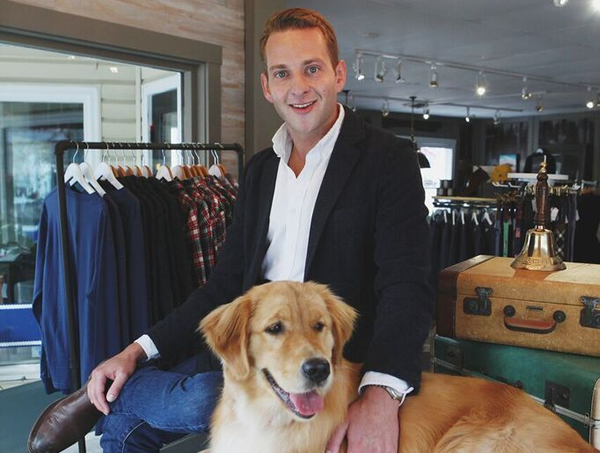Financial
New menswear shop now ashore in Rehoboth Beach
Youthful new retail entrepreneur helms his lifelong destiny M.G.T. & Co.


Michael Gabriel Thanner and Gracie inside the newly opened M.G.T. & Co. Mens Toggery Shop in Rehoboth Beach. (Photo courtesy Thanner)
Two summers ago, following a July 4th celebratory evening out at various Rehoboth Beach, Del., eateries and drinkeries, gay entrepreneur Michael Gabriel Thanner found himself a bit sozzled and languishing late-night with a long-time female friend on the stoop in front of 39 Baltimore Avenue, a block from the residential town and resort destination boardwalk.
“I’m going to have this store some day,” the visiting Maryland native declared. The casual comment was emblematic of Thanner’s easygoing manner and light-hearted, engaging disposition, as energetically adventurous as it is engagingly confident.

(Photo courtesy of Thanner)
Early in October, Thanner’s ambitious assertion became an abstemious reality with the opening of M.G.T. & Co. Mens Toggery Shop on the high-profile street.
The prominent commercial spot is anchored by surrounding and nearby retail businesses and restaurant venues. The former residential home and prior commercial storefront is adjacent to local landmarks the Blue Moon restaurant-bar and the CAMP Rehoboth Community Center.
This fall, alongside his one-year-old golden retriever and in-store companion Gracie, Thanner launched his men’s specialty clothing shop on his 27th birthday. The Oct. 10 birthday commencement of the retail enterprise is also symbolized in the easy-to-remember mnemonic time he opens the door each day, at 10:10 a.m. “It also ensures that I’m never late,” Thanner jokes.

(Photo courtesy of Thanner)
The shop is currently open seven days a week until 7 p.m., to both acquaint local residents and off-season visitors with Rehoboth’s newest addition to community enterprise and accommodate holiday shopping.
The free-spirited nature of new-proprietor Thanner is captured in the use of the informal, humorous, and British term “toggery” in the shop’s branding. A more casual expression for “haberdashery,” this off-kilter marquee nomenclature is a fitting reflection of the owner’s personality.

(Photo courtesy of Thanner)
The tagline additionally serves to convey the “British-inspired flavor of the shop’s offerings,” explains Thannery, noting that European labels from France, Germany, the Netherlands, and other international locales are also featured alongside American brands. “I carry lines with which people may not be familiar,” he says, “but I strive to always value quality over quantity” in curating the selection of items that will seasonally evolve.
“I specialize in providing an ‘old school’ foundation with a modern and youthful perspective,” says Thanner, “in a range of sizing and with something for everyone. The shop has a casual and personable environment,” he notes, describing the warm interior and attractive displays featuring a full range of merchandise, including everything from resort wear to blazers, scarves, boots, plush cashmere and more.
“I’m selling a lifestyle, not just an item or two,” asserts Thanner, “quality personal items are the foundation of a gentleman.”
Unique and distinctive labels include American purveyors Mizzen+Main dress shirts, Strong Boalt, Castaway, needlepoint belts and wallets from Smather and Branson, F.H. Wadsworth belts, handmade leather loafers by Jay Butler, Southern Proper, as well as Barbour from the United Kingdom, Hommard cashmere from the Netherlands, Armor Lux of France, Seaward and Stearn ties from the U.K., and New Zealand’s Rodd & Gunn.
Frequent solo travels when young and studying at Aix-en-Provence in the south of France influenced Thanner’s appreciation for European style and “knowing how to dress” as a practical part of one’s life. “You never know whom you’re going to run into, or where you’ll end up,” explains Thanner.
“If you look good, you feel good, and can have either $2 or $2 million in your pocket, no one would ever know.” Thanner credits his supportive parents, who encouraged their only child to travel and explore different cultures, for such insights. Growing up around his mother’s multiple retail shops specializing in gifts, accessories and home furnishings, also served as inspiration.

(Photo courtesy of Thanner)
Whether domestic or international, the shop’s clothing is “not tailored,” notes Thanner, “it’s more traditional but with a twist.” While representing the higher-end of the marketplace, pricing is consumer accessible with a range of price points. Thanner characterizes the shop’s focus as “America’s Ralph Lauren meets London’s Savile Row.”

(Photo courtesy of Thanner)
Hand-produced and bench-made products dominate, the result of a distinctly personal process of acquisition. “I was always well-dressed as a kid, originating with my own inspiration,” explains Thanner. Noted for his distinctive sense of style and attention to detail from a young age “led to requests to assist others with their personal shopping,” he recalls.
It was personal familiarity with noteworthy attire that forged the path for stocking his store. “I simply opened my own closet,” Thanner says, “and began cold-calling companies among the labels in my collection, asking to speak with a wholesale representative.”
“I knew early on that I could never have a standard 9-to-5 job,” Thanner admits, “I simply don’t have the attention span for it. Working for myself has always been in my blood, and I always knew I would have a shop of my own.”
“None of my friends were surprised at all,” says Thanner of his decision to open the shop. “I told several people over dinner one night, and signed a lease two days later. Of course, they think I’m ‘nuts’ for entering storefront retail, but you have to be willing to take risks to achieve success.”
“Opening in retail today is a risk,” acknowledges Thanner, “but you can’t focus on that. You have to jump right in and give it all you’ve got. The market is still there, especially in destination locations like Rehoboth where there is opportunity for specialty commerce.” He credits Murray Archibald, Steve Elkins, and everyone at CAMP Rehoboth for being supportive, and the welcoming attitude from other business owners and local residents.

(Photo courtesy of Thanner)
“I love Rehoboth, the sense of community, the energy, the vibe,” says Thanner, “and the small town charm and progressive environment. It’s a place entering a new era of enterprise, with an influx of new businesses and innovative approaches complementing an existing strong mix of retail.”
Thanner is inviting patrons and the public to an in-store holiday party on Dec. 9 to celebrate the shop’s opening and to “thank the community for their encouragement during the best time of the year to bring people together.”
M.G.T. & Co. Mens Toggery Shop is located in Rehoboth Beach, Del., at 39 Baltimore Ave. The shop is currently open each day of the week from 10:10 a.m. to 7 p.m. For more info, visit M.G.T. & Co. on Facebook and Instagram (the shop’s website is in development).
Mark Lee is a long-time entrepreneur and community business advocate. Follow on Twitter: @MarkLeeDC. Reach him at [email protected].
Real Estate
Spring updates to sell your home for pride and profit
Consider new landscaping, power washing, creative staging

Selling a home is a big deal for anyone, but for members of the LGBTQ+ community, it comes with unique considerations—from finding affirming professionals to ensuring your home is represented in a way that reflects your values. Whether you’re a first-time gay home seller or a seasoned LGBTQ+ homeowner looking to move up, maximizing your home’s value is key to a successful and empowering sale.
Here’s how to prepare your home, your mindset, and your real estate strategy to get the most value—financially and emotionally—from your home sale.
1. Start with an LGBTQ+-Friendly Real Estate Agent
Before diving into renovations or staging, make sure your agent truly understands your needs. A gay-friendly or LGBTQ+-affirming real estate agent brings more than just market expertise—they bring cultural competence, safety awareness, and a network that supports you throughout the selling process.
At GayRealEstate.com, you can find experienced, vetted LGBTQ+ real estate agents who have been proudly serving the community for over 30 years. Working with someone who shares or supports your identity ensures your selling journey is respectful, inclusive, and effective.
2. Enhance Curb Appeal—With a Welcoming Vibe
The outside of your home is the first impression a potential buyer gets. Make it count—especially for LGBTQ+ buyers looking for a home that feels safe and welcoming.
- Fresh landscaping: Add colorful flowers, neatly trimmed shrubs, or low-maintenance greenery to appeal to eco-conscious buyers.
- Update the entrance: A new front door, stylish lighting, or even a rainbow doormat can make your home feel like a safe space from the start.
- Clean and repair: Power wash the exterior, touch up paint, and make any necessary repairs to gutters, windows, or siding.
3. Stage with Intention and Inclusivity
Home staging can add thousands to your sale price. But beyond the usual decluttering and neutral palettes, think about how your space tells a story—and who it’s telling it to.
- Create a warm, inclusive feel: Subtle touches like LGBTQ+ art, books, or even coffee table magazines can show off your personality and affirm the space for queer buyers.
- Depersonalize—but don’t erase: You don’t need to hide your identity to appeal to buyers. Let your home feel lived in and loved—while still being a blank canvas others can imagine themselves in.
- Highlight multi-use areas: Home offices, gender-neutral nurseries, or flex spaces resonate with LGBTQ+ families and professionals.
4. Update Kitchens and Bathrooms Strategically
These rooms matter most to buyers—and even small updates can yield big returns.
- Kitchen: New cabinet hardware, a fresh backsplash, and modern lighting can elevate the entire room without a full remodel.
- Bathroom: Replace old fixtures, re-caulk tubs and sinks, and add plush towels and inclusive décor.
- Energy-efficient upgrades: Touchless faucets, smart appliances, or low-flow toilets are not only trendy—they signal sustainability, which matters to LGBTQ+ buyers.
5. Make Your Home More Energy Efficient
LGBTQ+ homebuyers often prioritize sustainability. These updates not only reduce energy bills but make your home more marketable.
- Install a smart thermostat (like Nest or Ecobee)
- Upgrade insulation or windows
- Consider solar panels (especially in sun-drenched regions like California or Florida)
Bonus: You may qualify for state or federal tax credits, which can be a great selling point.
6. Know and Advocate for LGBTQ+ Housing Rights
Although housing discrimination is illegal under the Fair Housing Act, it still happens. As an LGBTQ+ seller, be aware of your rights—and those of potential buyers.
- Avoid steering or bias: Even with good intentions, make sure you’re not inadvertently influencing who views or buys your home based on identity.
- Work with affirming professionals: From inspectors to lenders, choose partners who support inclusive practices.
- Report discrimination: If you or a buyer encounters bias, report it to HUD or your local housing authority.
7. Price Your Home Right—and Market It Smartly
Setting the right price is essential to maximizing value. Your LGBTQ+-friendly agent can run a comparative market analysis, considering current trends and buyer demographics.
- Leverage LGBTQ+ real estate networks: Promote your home through platforms like GayRealEstate.com to reach an audience that understands and values your space.
- Use inclusive language in listings: Avoid gendered terms or heteronormative assumptions. Instead of “his and hers closets,” use “dual walk-ins” or “double closets.”
- High-quality photos and video tours: Showcase your home with professional, visually inclusive marketing that appeals to diverse buyers.
8. Consider Timing and Local LGBTQ+ Trends
Selling during WorldPride or just before local LGBTQ+ events may boost visibility. Also consider if you’re in or near an LGBTQ+ friendly city or neighborhood.
Not sure which areas are top destinations? GayRelocation.com tracks and shares the best cities for LGBTQ+ homebuyers, helping you tap into motivated buyers.
Final Thought: Sell with Confidence—and Community
Selling your home isn’t just about getting top dollar—it’s about closing a chapter with pride and integrity. When you center your values, work with LGBTQ+ affirming experts, and prepare your home with purpose, you’re not just maximizing your home’s value—you’re creating an empowering experience for yourself and the next owner.
Whether you’re buying, selling, or both—GayRealEstate.com is your trusted partner in every step of your journey. With a nationwide network of gay and lesbian realtors, decades of experience, and deep community ties, we ensure your home transition is safe, smart, and full of pride.
GayRealEstate.com is the nation’s leading online platform connecting LGBTQ+ home buyers and sellers with LGBTQ+ friendly real estate agents, ensuring a safe and supportive experience.
Scott Helms is president of GayRealEstate.com. To find an agent or learn more, visit GayRealEstate.com, GayRelocation.com or call 1-888-420-MOVE.
Real Estate
Navigating DMV real estate market during political unrest
Reductions in federal employment have introduced uncertainties

The Washington, D.C.-Maryland-Virginia (DMV) region has long been recognized for its robust housing market, underpinned by the presence of the federal government and a diverse economic landscape. Recent massive reductions in federal employment have introduced uncertainties, yet the area continues to offer compelling reasons for prospective homebuyers, particularly within diverse communities.
While the federal government has traditionally been a significant employer in the DMV, the region has proactively diversified its economic base. Sectors such as technology, professional services, education, and healthcare have expanded, mitigating the impact of federal job cuts. This diversification fosters some economic resilience, which offers our area a semblance of protection against the impending unknowns that we currently face. Nothing can shield real estate entirely; however, our area tends to survive these types of changes better than other parts of the country.
Despite concerns over federal layoffs, the DMV housing market has demonstrated notable stability. Analyses indicate that the number of active listings, sold properties, and median sales prices have remained steady on a year-over-year basis. This steadiness suggests that the market is adapting to changes without significant disruption.
Furthermore, while there has been a slight increase in home listings, this trend aligns with typical seasonal variations and does not solely reflect federal employment changes. The luxury property segment, in particular, continues to thrive, indicating sustained interest and investment in the region.
The DMV region is renowned for its cultural and demographic diversity, with areas like Montgomery County, Md., being among the most ethnically diverse in the nation. This inclusivity extends to various communities, including LGBTQ individuals, fostering a welcoming environment that enhances the area’s appeal. Even though the current administration is fostering anti-diversity ideology, I remain confident that our LGBTQ community will continue to thrive even as these destructive forces work against us.
Local governments within the DMV have implemented policies aimed at promoting affordable housing and preventing displacement, particularly in the wake of economic shifts. Initiatives like the Douglass Community Land Trust in Washington, D.C., exemplify efforts to maintain housing affordability and support community stability.
Additionally, jurisdictions such as Montgomery County have longstanding Moderately Priced Dwelling Unit (MPDU) programs that require developers to include affordable housing in new residential developments. These policies contribute to socioeconomically mixed neighborhoods, benefiting diverse populations.
Despite Elon Musk’s brandishing of a chainsaw to the federal workforce, our real estate market continues to thrive. The DMV region maintains its appeal. Economic diversification, market stability, commitment to diversity and inclusion, and progressive housing policies collectively contribute to an environment that supports and attracts diverse communities. Prospective homebuyers can find reassurance in the region’s resilience and ongoing efforts to foster an inclusive and vibrant community. These are only a few among the many reasons to have a positive outlook while considering real estate options in our area.
It is important to consider working with brokerages, brokers, agents, lenders and title companies who align with our community and our objectives. Not all LGBTQ agents work for brokerages that support or understand the needs of the members of our community. Do your research and find out who has donated money to what political causes. Now more than ever we must support members of our community to protect our way of life and our very existence.
Stacey Williams-Zeiger is president/principal broker of Zeiger Realty Inc. Reach her at [email protected].

Whether you are upgrading parts of your current home to prepare it for sale or enhancing the home you just purchased, kitchens and bathrooms are still at the top of the renovation list.
Kitchen renovations have always embraced a blend of functionality, personalization, and aesthetic appeal; however, homeowners are currently moving away from sterile, uniform designs, opting instead for spaces that reflect warmth, character, and individual style. Here are some of the most prominent trends shaping kitchen renovations this year.
Warm and Earthy Tones
The dominance of all-white kitchens is waning as homeowners gravitate toward warmer, earth-toned palettes. Shades like sage green, navy blue, and natural wood finishes are becoming popular choices for cabinetry, infusing kitchens with a cozy and inviting atmosphere. This shift reflects a desire for spaces that feel more personalized and less clinical. Flat panel and Shaker cabinets continue to be popular options.
Integration of Organic Modernism
The “modern organic” style is gaining traction, characterized by using natural materials, neutral color palettes, and serene layouts. Incorporating elements like soapstone countertops, Venetian plaster walls, slate floors, and greenery not only enhances aesthetic appeal but can also increase home values significantly. Fully outfitted outdoor kitchens further contribute to this trend.
Innovative Kitchen Island Designs
Kitchen islands continue to be central features, with designs evolving to incorporate textures, wood and tile cladding, multifunctional elements, and bold colors and materials. Integrated seating areas, waterfall countertops, and the use of monolithic stone or stacked marble are becoming increasingly popular. These islands not only serve as functional workspaces but also as striking focal points within the kitchen.
Concealed Kitchens for a Sleek Look
The concept of concealed kitchens is on the rise, emphasizing built-in appliances, flush cabinetry, and appliance garages to maintain a clutter-free environment. This design approach fosters a minimalist aesthetic, creating a seamless flow between the kitchen and adjacent living areas, particularly in open-concept homes.
Personalized Cabinetry and Storage Solutions
Customization is key in modern kitchen designs, with homeowners seeking tailored storage solutions that cater to their specific needs. Features like hidden storage compartments, integrated lighting, and unique hardware choices are being favored over generic, cookie-cutter options. This trend underscores a move toward kitchens that are both functional and reflective of personal style.
Revival of Traditional Styles with Modern Twists
Traditional kitchen styles are making a comeback, with a contemporary twist. Elements such as expanded backsplash coverage, classic tile shapes and patterns, use of mixed metals, and specialty appliances are being integrated into modern kitchens, blending the charm of the past with the conveniences of the present. Custom range hoods, coffee bars and microwave drawers are increasingly added to renovation projects. This fusion creates spaces that are both timeless and equipped for modern living.
Sustainable and Natural Materials
Sustainability remains a priority, with an increased use of eco-friendly materials like reclaimed wood, recycled metals and glass, and energy-efficient appliances. This not only reduces environmental impact but also introduces unique texture and shimmer into kitchen designs, adding depth and character to the space.
Use of Bold Colors and Accents
Homeowners are becoming more adventurous with color and texture, incorporating vibrant hues and tactile materials into their kitchen designs. Features like colorful window trims, two-tone cabinets, and the use of wallpaper and feature walls add visual interest and a personalized touch to the space. In addition to the familiar white, major appliances are now shown in matte black, navy, and jewel tones of red, green, and blue. There are even vinyl wraps and magnet covers that allow for more creativity and individualization with appliances.
Integration of Smart Technology
The incorporation of smart technology continues to grow, with appliances featuring automated cooking functions, sensor reheating, and control locks becoming more prevalent. Induction stoves are entering the mix. Charging stations and touch-activated cabinet doors and faucets are also popular. LED lighting lasts longer and prevents you from having to climb a ladder to change lightbulbs on a high or vaulted ceiling. These advancements enhance convenience and efficiency, aligning with the modern homeowner’s desire for a kitchen that supports a tech-savvy and busy lifestyle.
Multifunctional Spaces
Kitchens are increasingly being designed as multifunctional spaces that accommodate cooking, dining, working, and socializing. This has led to the inclusion of features like integrated seating, versatile lighting, and adaptable layouts that can easily transition between different uses, reflecting the evolving role of the kitchen in contemporary homes. Still, don’t be surprised to see a resurgence of self-contained kitchens with real walls.
So, whether the kitchen you want is sleek and modern, earthy and organic, or traditional and elegant, there will always be fresh new styles, ideas, innovations and classic touches that cater to your lifestyle.
Valerie M. Blake is a licensed Associate Broker in D.C., Maryland, and Virginia with RLAH @properties. Call or text her at 202-246-8602, email her via DCHomeQuest.com, or follow her on Facebook at TheRealst8ofAffairs.
-

 State Department4 days ago
State Department4 days agoHIV/AIDS activists protest at State Department, demand full PEPFAR funding restoration
-

 Brazil4 days ago
Brazil4 days agoUS lists transgender Brazilian congresswoman’s gender as ‘male’ on visa
-

 Federal Government5 days ago
Federal Government5 days agoWhite House sues Maine for refusing to comply with trans athlete ban
-

 District of Columbia4 days ago
District of Columbia4 days agoCapital Pride wins $900,000 D.C. grant to support WorldPride












